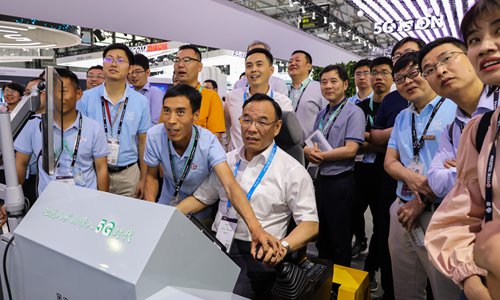HOME >> BUSINESS
Huawei warns against politicizing patent protection
By Chen Qingqing in Shenzhen Source:Global Times Published: 2019/6/27 22:18:41
Conflicts reflect US ignorance of China’s efforts in innovation: analysts

Attendees to MWC19 Shanghai try their luck at a remote mining cockpit powered by Huawei 5G technology. Photo: VCG
Huawei's call against politicizing patent protection reflects China's overall stance on intellectual property rights (IPRs), as some US officials have intentionally ignored the country's overall progress in innovation.
Recent proposed legislation in the US Senate would bar Huawei from seeking patent fees in the US, a move that is widely seen as a slap in the face for the US delegation involved in the bilateral trade talks.
The Chinese company said on Thursday that it has received more than $1.4 billion in licensing revenue since 2015, and as a technology company, Huawei's principle is to protect IPR, which is the company's primary responsibility.
The comments were made by its chief legal officer Song Liuping after the company announced plans to seek $1 billion in patent fees from US carrier Verizon for more than 230 patents, which led to opposition from US Senator Marco Rubio, who claimed that Huawei is using the tactics of patent trolls to attack US companies in retaliation for US export controls.
"If politicians use IPR as a political tool, they will destroy confidence in the patent protection system. If some government selectively strips companies of their IPR, it will break the foundation of global innovation," Song told a press conference at the company's headquarters in Shenzhen, South China's Guangdong Province.
Over the past 30 years, the Chinese company has paid more than $6 billion in royalties to use the IP of other companies legally, and about 80 percent was paid to US companies. Huawei couldn't have become a technology leader by not respecting patent protection, Song said.
Rubio recently proposed legislation to prevent Huawei from enforcing its patents in the US, after the Chinese company chased Verizon on more than $1 billion in patent license fees. Under the senator's proposal, Huawei would "not be allowed to seek relief under US law with respect to US patents, including bringing legal action over patent infringement."
"We don't believe his proposed legislation has any chance of being passed by Congress," Song said, noting that seeking patent fees is common business practice, as Huawei is both a licensee and licenser of primary core patents, especially in 5G.
Contradictory acts
When it comes to patent disputes, US officials appear to have become arrogant and ideologically biased, accusing China of IP theft without thoroughly looking into the facts, analysts said. Huawei's call against weaponizing the patent issue further illustrated how deeply the Trump administration misunderstood China's efforts in innovation and technology development.
"Some US politicians do not believe in China's technology and its innovation in cutting-edge technologies, they think we're always following behind them," Zhi Zhenfeng, a legal expert at the Chinese Academy of Social Sciences, told the Global Times on Thursday.
When they could not stop Chinese technology companies from seeking IPR protection in a legitimate way, they used immoral behavior to contain those companies from defending their legal rights, which violates the US Constitution and international rules, he said.
Ironically, the US trade delegation has been pressuring its Chinese counterparts over IPR issue. Emphasizing patent protection but preventing others from doing so are contradictory acts, which could be seen as a slap in the face for US negotiators, according to analysts.
Huawei is one of the major contributors to global 5G standards, and all participants are also sharing Huawei's product results, Song told the Global Times.
"Huawei also holds the rights to standard essential patents that are registered in China. Applicants in the US and Europe who adopt these standards are using Huawei's patents," he said on Thursday.
Newspaper headline: Huawei warns against politicizing IPR
Posted in: COMPANIES